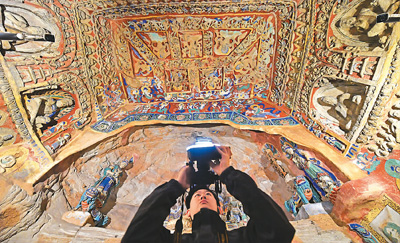Over 80 percent of Chinese believe virtual tourism enriches their travel experiences: survey

A staff member of the Yungang Grottoes Research Institute collects data in Yungang Grottoes in Datong, Shanxi Province. (Photo/Xinhua)
A survey by China Youth Daily found that 84.1 percent of Chinese people who were interviewed by the paper believe that virtual tourism has enriched their travel experiences.
Meanwhile, 74.8 percent of those surveyed said that they would take online tours and 59.7 percent of them noted that virtual tours can bring them wonderful experiences.
Among the 2,085 respondents, the post-1990s generation accounted for 40 percent, followed by the post-1980s generation at 25 percent and the post-2000s generation at 24.9 percent.
According to the survey, 67.4 percent of the respondents thought that virtual tours can help avoid long queues, and 60.3 percent of them said that virtual tours allow them to reduce travel costs. Others said virtual tours have many other benefits such as providing a more diverse range of attractions available online, real-time interactions with people on site, as well as immersive experiences.
Wang Bo, an employee at an Internet company in Beijing, is a museum-lover. Wang said that although the COVID-19 epidemic prevention and control measures have meant that people have fewer chances to visit museums, live streaming, virtual reality (VR), and other technologies enable increasingly convenient virtual museum tours completely online.
Wang has taken virtual tours of several museums, including the Palace Museum. Online tours can break through the limitations of time and space and present tourism resources to more people, Wang said, adding that virtual tours also allow viewers to take a 360-degree look at some exhibits and provide an opportunity to re-visit them again at any time.
Digital technologies have empowered the entire tourism sector, and virtual tours have become a vital choice for visitors, according to Li Bowen, a professor at the Tourism College of Beijing Union University.
Powered by digital technologies, which create more possibilities for the production of tourism-based content, virtual tours enable new forms for presenting tourism resources, Li said.
Meanwhile, virtual tours allow tourists to gain access to places they might never have been able to visit in real life.
Lin Lulu, born in the 1990s, loves taking virtual tours through live streaming during her spare time. “The Qinghai-Tibet Plateau is a highly attractive destination to me, but I have not yet visited the place due to a lack of time and concerns over physical conditions,” Lin said, adding that a virtual tour of the plateau can also satisfy her mentally.
Liu Simin, vice president of tourism at the Chinese Society for Future Studies, said that virtual tours can improve travel experiences. Liu introduced that devices empowered by virtual technologies and VR at offline venues enable visitors to enhance their experiences.
If tourists miss something during their visit to a scenic spot while in person at the scene, they can make up for it through virtual tours, Liu added. For example, many visitors usually have fewer opportunities to enjoy the fantastic sceneries during all of the four seasons while visiting Jiuzhaigou, a famous scenic area in southwest China’s Sichuan Province, but they are able to do so via online tours, Liu said.
Photos
 China’s central bank to issue commemorative coins on cultural theme of auspiciousness, including two heart-shaped coins
China’s central bank to issue commemorative coins on cultural theme of auspiciousness, including two heart-shaped coins Population of endangered black-headed gulls exceeds 10,000 mark in NE China’s coastal city of Panjin
Population of endangered black-headed gulls exceeds 10,000 mark in NE China’s coastal city of Panjin China's self-developed floating airship breaks record
China's self-developed floating airship breaks record Chinese germplasm bank conserves biodiversity in warm temperate zone
Chinese germplasm bank conserves biodiversity in warm temperate zone
Copyright © 2022 People's Daily Online. All Rights Reserved.






